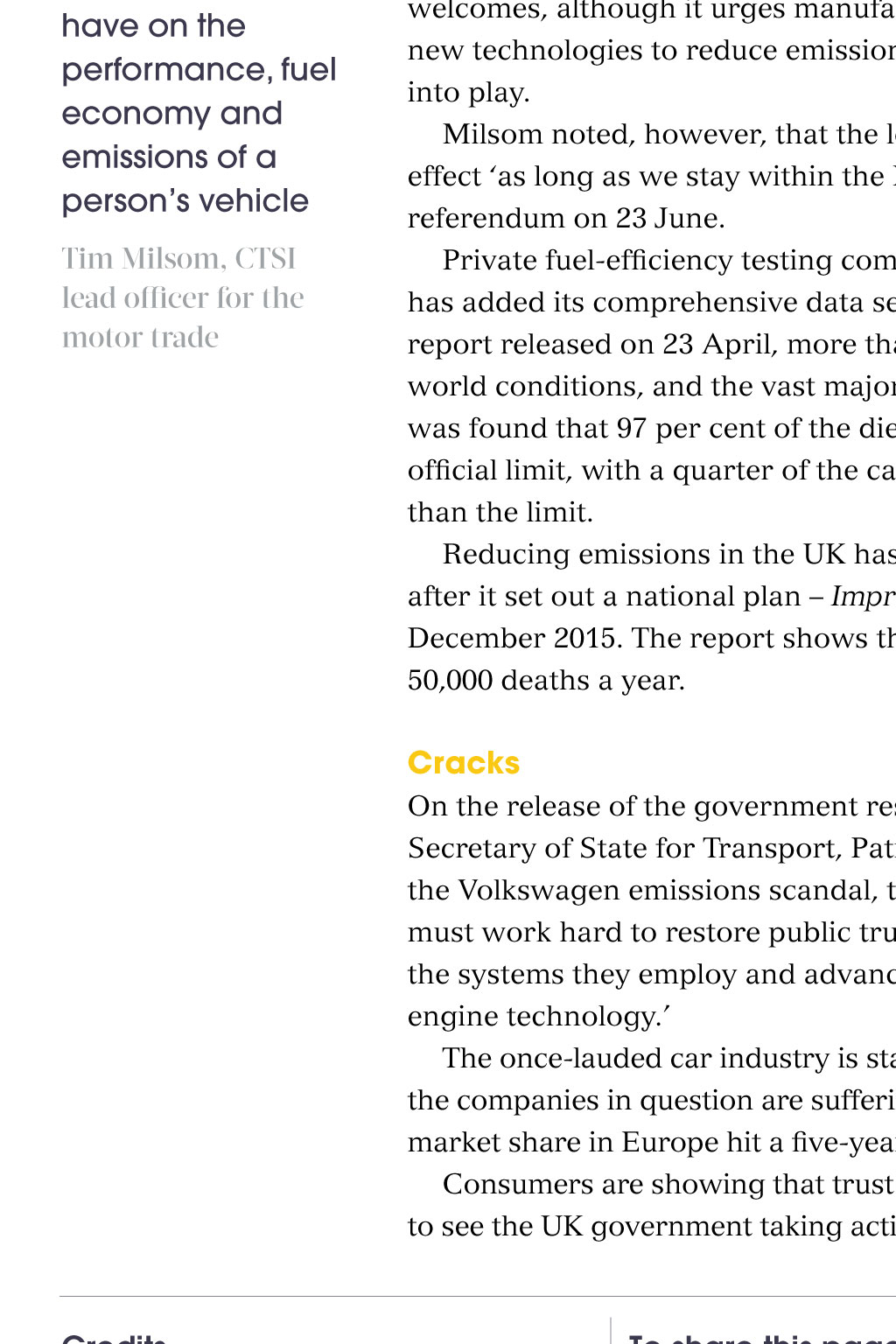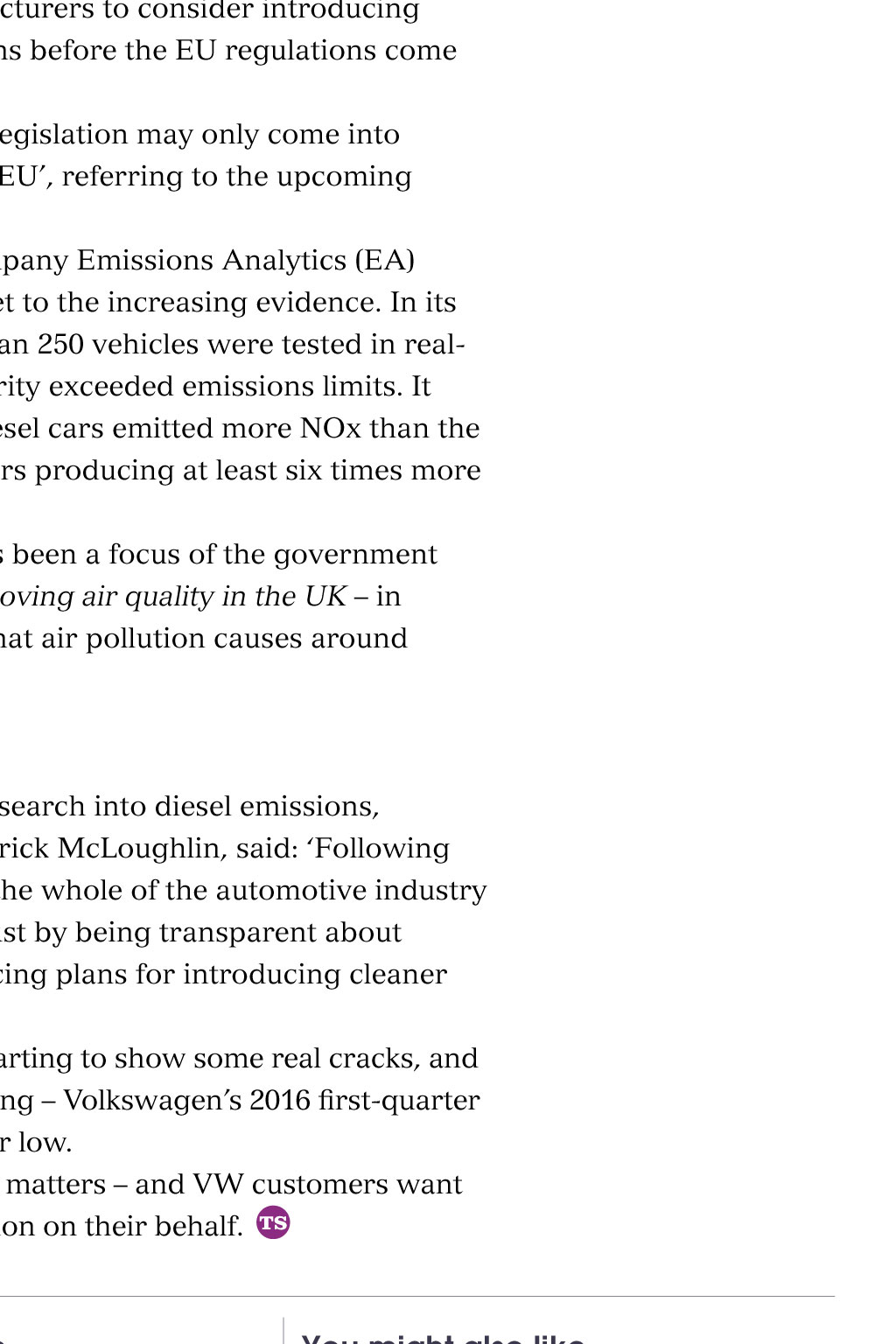




























Motor industry: emissions scandalsIn this feature l serious fraud l car sector l EU legislation Time for action The Volkswagen emissions scandal erupted seven months ago – but still no cars in the UK have been fixed. Is it time for the government to step in? Maeve Sinnott investigates, as a new report finds excessive emissions across many diesel modelsThe Transport Secretary must now intervene and stand up for UK consumers Richard Lloyd, executive director of Which? In a consumer survey conducted by Which? on 23 and 24 April, three-quarters of people said the government needed to take immediate action against Volkswagen (VW) – while 94 per cent of the 30,000 respondents believed car manufacturers are not being fair to UK consumers. Richard Lloyd, executive director of Which?, said that ‘VW customers feel conned’ and added: ‘The US government has acted quickly to hold VW to account. In the UK, progress to date has been woefully slow. The Transport Secretary must now intervene and stand up for UK consumers.’ Seven months after the eruption of the VW emissions scandal – which affected 1.2 million car owners in the UK – customers remain in the dark about how their cars will be fixed, what the impact on their vehicles will be, and whether or not they are entitled to compensation – a situation that Lloyd described as ‘completely unacceptable’. There is also a worrying lack of independent guidance for consumers. Citizens Advice said the issue does not come under its remit, while a spokesman for the Department for Business, Innovation and Skills (BIS) admitted that, to its knowledge, ‘there is no point of official advice for consumers’. There was further public outrage when Volkswagen announced it had reached an agreement with US authorities on 21 April – reportedly a compensation deal for US consumers, while UK consumers have heard nothing of the kind – and decided to delay publication of its own report into the emissions scandal, which was expected at the end of April. The Volkswagen saga continues amid a developing mistrust of the automotive industry. A UK government report, published on 21 April, found that every diesel car model it had tested produced higher nitrogen oxide (NOx) emissions in real-world and test-track conditions than in laboratory conditions – highlighting the inadequacy of current laboratory tests, and the fact that consumers do not know the real emissions levels of their cars. Mitsubishi is the latest brand to take a hit, after recent admissions that the Japanese company has falsified some of its fuel consumption tests – since 1991. It is unclear whether the affected cars have been sold outside the domestic Japanese market, but the investigation will cover overseas markets. Calling on government So where can the 1.2 million UK customers who own a Volkswagen car affected by the emissions scandal get independent information on their options? Citizens Advice has confirmed that the issue does not fall within its remit and it has no figures on people making enquiries or asking for their options regarding Volkswagen vehicles. BIS was unable to suggest an organisation or area of advice for consumers. Tim Milsom, CTSI lead officer for the motor trade, said there is information available from Volkswagen’s website, online websites/news sites and from many lawyers – though he warned about the multiple motives of lawyers, and is ‘not totally convinced’ by specific vehicle information on Volkswagen’s website. A spokesperson for VW said the company has ‘written to all UK customers with an affected vehicle twice’ and confirmed that they will send out communications to customers again ‘as soon as the specific technical measure is ready for their vehicle, inviting them to come to an authorised repairer to have the work carried out’. Where advice comes from is not the only issue, however. According to Milsom, only ‘around 64 per cent of vehicles are traditionally returned for recall action’ in Europe. Furthermore, the effect of the modifications included in the recall is not yet known. ‘We have no idea what effect the recall will have on the performance, fuel economy and emissions of a person’s vehicle,’ he said. ‘There will be different modifications for each vehicle – some may need a software update, replacement injectors and/or the fitting of a flow transformer, which is a device to induce additional inlet air swirl to aid the fuel-air mix and cleaner combustion.’ One risk is that modification could add additional costs to running the vehicle – for example, because of a reduction in fuel efficiency. Milsom noted the lack of figures available, and said the Department for Transport has been ‘cagey’ by not making more information available to the public. According to the government, it first become aware of the ‘defeat devices’ fixed to VW vehicles on 18 September 2015, and then launched a test programme for VW cars in the UK on 2 October. Lloyd has said that – if it has key information – ‘the government must stop sitting on any evidence that can help fully inform consumers’. Compensation? Volkswagen has undoubtedly committed fraud offences but, according to Milsom, determining the degree of these is impossible from a legal perspective without having full information on consumer losses – including costs because of vehicle modification. Yet the automotive company reached an agreement with US authorities on 21 April, which is likely to include a buy-back scheme and compensation for US consumers. In November 2015, Volkswagen announced that 482,000 vehicle owners in the US would be eligible to receive $1,000 in vouchers, in addition to amounts it offered to owners for trade-in – while, in January 2016, it was announced that UK owners would not receive any such payments. A Volkswagen spokesman explained that differences in markets and stricter emissions limits meant that modifying vehicles in the US is ‘much more complex than in other countries’, so longer and multiple visits to workshops are necessary – compared with quicker technical alterations for European vehicles. Consumers in Germany, home of the global car brand, are also unlikely to receive compensation. Lloyd said: ‘Separate to the legal debate about compensation claims, people simply cannot understand why VW has offered US consumers a goodwill payment while refusing to provide this for their UK customers affected by the very same issue. VW seems to have put UK consumers at the back of the queue.’ A current Transport Committee inquiry is looking into the case for compensating affected vehicle owners. Emissions in the UK The UK government published its research into emissions levels from leading diesel car models on 21 April. This found that all of the vehicles – 37 different types in the UK – produced higher NOx emissions in real- world and test-track conditions than in laboratory conditions. The discrepancy is not because of cheating devices – such as in Volkswagen vehicles – but because of the use of engine management systems that lead to higher emissions in real-world conditions, which are cooler than in laboratories. EU legislation set to come into force next year will establish ‘real- world driving emissions’ tests – which the cross-departmental report welcomes, although it urges manufacturers to consider introducing new technologies to reduce emissions before the EU regulations come into play. Milsom noted, however, that the legislation may only come into effect ‘as long as we stay within the EU’, referring to the upcoming referendum on 23 June. Private fuel-efficiency testing company Emissions Analytics (EA) has added its comprehensive data set to the increasing evidence. In its report released on 23 April, more than 250 vehicles were tested in real- world conditions, and the vast majority exceeded emissions limits. It was found that 97 per cent of the diesel cars emitted more NOx than the official limit, with a quarter of the cars producing at least six times more than the limit. Reducing emissions in the UK has been a focus of the government after it set out a national plan – Improving air quality in the UK – in December 2015. The report shows that air pollution causes around 50,000 deaths a year. Cracks On the release of the government research into diesel emissions, Secretary of State for Transport, Patrick McLoughlin, said: ‘Following the Volkswagen emissions scandal, the whole of the automotive industry must work hard to restore public trust by being transparent about the systems they employ and advancing plans for introducing cleaner engine technology.’ The once-lauded car industry is starting to show some real cracks, and the companies in question are suffering – Volkswagen’s 2016 first-quarter market share in Europe hit a five-year low. Consumers are showing that trust matters – and VW customers want to see the UK government taking action on their behalf. To share this page, You might also likeMitsUbishi Mishaps On 20 April, Mitsubishi Motors Corporation (MMC) announced that it had ‘conducted testing improperly to present better fuel consumption rates than the actual rates’. Further, it confirmed that the testing method was ‘different from the one required by Japanese law’. MMC believes the affected vehicles sold with false information were only available in the Japanese domestic market, but the company ‘will also conduct an investigation into products manufactured for overseas markets’. On 26 April, however, it emerged that Mitsubishi Motors Corporation had been supplying incorrect fuel- economy information for 25 years – since 1991. We have no idea what effect the recall will have on the performance, fuel economy and emissions of a person’s vehicle Tim Milsom, CTSI lead officer for the motor trade Credits Maeve Sinnott is a junior reporter for click on  in the toolbar Turning back the clocks – May 2016 TS Today. Images: Quarta / Shutterstock